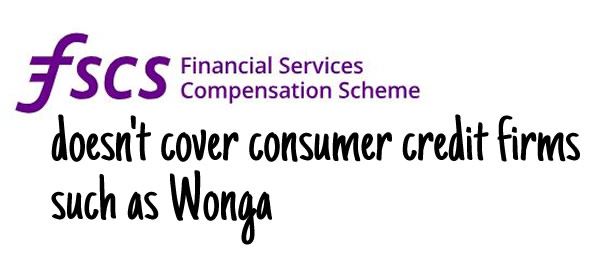In 2018, when Wonga went into administration, people started asking why the Financial Ombudsman (FOS) can’t still look at Wonga complaints? And if FOS can’t, is there is a guarantee system that would step in if Wonga fails, such as the FSCS?
This has become more important every year since then, with most of the major payday lenders failing, including the Money Shop, QuickQuid, Sunny and Myjar.
From 2020, other sorts of high cost lenders have also being failing, either going into administration (BrightHouse, Buddy Loans, Loans At Home) or into a Scheme (Provident and Amigo).
Contents
Why FOS sends complaints back to the administrators
In the Insolvency Act there is a moratorium against legal proceedings being started or continued once a firm goes into administration.
The courts interpret “legal proceedings” to include quasi-legal proceedings such as arbitration, see Straume Ltd v Bradlor Dev. Ltd [1999] As FOS decisions are legally binding, they seem very likely to come under the category of quasi-legal proceedings.
FOS, therefore, had no choice about what to do. It couldn’t carry on looking at the Wonga cases it already had. They had to go back to the Administrators.
Also realistically even if FOS had legally been able to carry on looking at cases it had already been sent, there wasn’t enough money to pay them all in many administrations.
The FSCS
In the UK, the Financial Services Compensation Scheme (FSCS) provides a safety net for many customers:
- if your bank fails the money you have in a current or savings account is protected up to £85,000;
- if you were claiming a PPI refund and the company went under, the FSCS paid your refund in full. This happened with Welcome Financial Services.
The FCA rulebook says:
By making rules that allow the FSCS to provide compensation at a level appropriate for the protection of retail consumers and small businesses, the FCA enables consumers to participate in the financial markets with the confidence that they will be protected, at least in part, should the relevant person with whom they are dealing, or a successor, be unable to satisfy claims against it.
Is Wonga, or another payday lender, covered by the FSCS?
The FSCS website says
- We can pay compensation only when an authorised firm is in default. We will carry out an investigation to establish whether or not this is the case.
- We can pay compensation only for financial loss and there are limits to the amounts of compensation we can pay.
That may sound promising, because Wonga is authorised by the FCA.
But the FCA register for Wonga said in 2018:
It cannot be determined if FSCS cover would apply to this firm. Please contact the firm directly to understand whether their products/services would be covered by FSCS.
Not all business done by FCA authorised firms is covered by the FSCS. A claim has to be about one of the following types of business:
- some investments (see COMP 5.5); or
- some mortgage advice (see COMP 5.6); or
- some insurance contracts, which includes PPI (see COMP 5.7); or
- loss of client money by a debt management firm (see COMP 5.8).
In addition, deposit protection – your savings at a bank – are covered by the PRA rulebook.
That list doesn’t include giving loans, so claims against Wonga and other lenders are not covered by the FSCS.

The FCA decided not to extend the FSCS to cover lending
In 2014 when the FCA took over regulating the consumer credit market, including payday lenders, it said:
The Financial Services Compensation Scheme (FSCS) can pay compensation where a firm is unable to. Consumer credit will not be covered by the FSCS straight away. We will review this when all firms are authorised by us.
But in 2016, the FCA decided:
Having now considered the issue in more detail, we still believe that most consumer credit activities should remain outside FSCS protection because our other regulatory requirements are sufficient.
At that point, it only made the minor extension to FSCS coverage to include debt management, not to include lenders such as Wonga.
How did the FCA justify this?
In 2019, the Treasury Select Committee asked the FCA why high cost short term lending (ie payday loans) hadn’t been included in the FSCS, whether the FCA now intended to consult about this and if not, how they would ensure that customers were not disadvantaged when a payday lender goes into administration.
The FCA response said its actions such as the price cap had reduced the likely losses to consures. The letter said:
“it is our view that consumer credit activities… are unlikely to give rise to financial losses for consumers either (i) often or (ii) of significant amounts.”
But by the end of 2021, it has become clear that millions of customers have lost out as a result of high cost lenders failing.



Jon says
One point on this Sara, Welcome Finance provided consumer credit and claims against them have been covered by the FSCS. So why couldn’t the same happen with Wonga? Jon
Sara (Debt Camel) says
See https://www.fscs.org.uk/what-we-cover/ppi/welcome-finance/
Jon says
Thanks Sara, so it was only the PPI element that was covered by the FSCS.
Julia says
The Financial Services Compensation Scheme (FSCS) is basically a finance industry-funded insurance scheme for certain regulated firms. As well as the products listed above, it also covers savings held by banks, building societies and credit unions.
If the FSCS is extended to cover lending and other authorised products, the scope, scale and complexity would increase Scheme costs beyond all recognition.
The (compulsory) levies to support the Scheme vary depending on the size and type of firm (e.g. credit unions, as not-for-profits, pay less than a large bank), so a risk-based fee model would mean that high-cost lenders would pay more. But, although it might be in the interest of the consumer in the short-term (and even that is arguable), having the FSCS pay out for claims of this nature would substantially increase the costs to the industry and tax-payer longer-term.
Smaller, ethical lenders, like credit unions and CDFIs often operate on a tiny margin. If they are forced out of the industry because of increasing costs and burdens of regulations and levies as a consequence of poor lending practices elsewhere, that would be detrimental on many different levels.
No-one would argue against tighter regulation in many parts of the market, but we do need to beware the law of unintended consequences and protect the ‘good guys’ in the industry.
Brian Rose says
It’s interesting to read what Julia says but why was Wonga (and the other payday lenders) allowed to operate in the way they did in the first place ? In other words why is it that any financial institution’s business plan isn’t scrutinized before they’re allowed to start trading. This is a classic example of closing the stable door after the horse has bolted. The net result is that lots of people can get ripped off which produces mega profits for the business owners and then when the regulator wakes up and belatedly takes action the financial institution can just shut up shop and walk away leaving the victims high and dry. If only the directors/business owners were personally liable then you wouldn’t get such rip off practices in the first place.
Julia says
They shouldn’t have been allowed to operate like this, I agree 100%. Much of their behaviour was absolutely disgraceful.
My point was specific to the question of ‘should the FSCS cover lending and therefore pay out compensation claims if the lender goes into administration?’ (Summary – I don’t see a situation where it could).
Sara and many others in the advice and finance sector (including myself) have been calling for tighter regulation for many years. The limits put on payday lenders only resolved a small part of the problem, we would like to see controls on credit cards, rent-to-buy and catalogues, as well as overdraft fees.
I don’t want to speak for Sara, but I’d personally like to see much more support for ethical alternatives such as credit unions and CDFIs.
jon says
Wonga has gone into Administration
daniel says
Hi sarah
i currently owe around £1000 to wonga on a debt management plan
however i currently have a claim in with FoS who replied to say i have a very good case but needs more information
my question is for example
if the omburdsman says
i am owed £1200
( wonga probably wont pay up then as they have collapsed )
could i then cancel the payment for the £1000 i then owe them ??
Sara (Debt Camel) says
What is the “extra information” that the FOS has asked for?
Sara (Debt Camel) says
I asked what the extra information was because it would be very unusual for the FOS to tell someone they have “a very good case” if they don’t have all the information they need.
I have been talking to another reader who said something similar. In his case he had been going through a claims company and the FOS had told the Claims co that the lender may not have made all the necessary checks and asked for additional bank statements and details of expenses.
If this is what is happening to you, you need to be aware that unless you can produce the requested information you may well lose your case.
In some cases the clueless/lazy claims co seems to be routinely replying “my client is unwilling to provide any further information and can you consider the case as it stands” – this is convenient for the claims co as it’s just another standard reply they can send, not requiring any work or human thought from them. But it can be very damaging to your case!
Joanne says
I currently owe 175.00 on a w onga loang reluctant to pay this as it seems unlikely that I will not get refunded for the previous extorinately high borrowing pricing I have received a message to say the loan is now overdue first time ever and they continue to add interest is that legal when they are not trading do I settle this loan and then apply for refunds or should I fill in appropriate PPI forms or refund forms first i too many companies offer to loan people with extortionate lending fees
Perhaps you could advise
Regards joannr
Sara (Debt Camel) says
Can they continue to add interest when they are not trading? Yes, the terms of your loan remain the same.
BUT with payday loans there is a legal limit (known as the price cap) to the amount of interest that can be added, you can never be asked to pay more in interest and charges than the amount you borrowed. And this limit is usually reached pretty quickly as the initial interest rates are so high!
If you can afford to repay this loan without borrowing more you should probably settle it. But if repaying the 3175 will leave you with money problems then it’s best to not pay it and put in a complaint.
Sara (Debt Camel) says
These refunds are not the same as a PPI refund. And you can’t complain because the interest rates were high… but if the loans you had from Wongs were unaffordable for you (which means that you couldn’t repay them without borrowing again to get through the next month) then you have an affordability complaint.
For how to make this affordabilty complaint, read Wonga refunds – latest news which explains this for Wonga.
As you currently owe them money you are in a stronger position to get a refund actually paid to you than if you had repaid your current loan. If the refund decided is more than the £175 you owe, the current balance will be wiped out.
.
tom g says
Could the fca and the fscs be a waste of time? do we pay for these services as a tax payer? If so should we question why they are needed if they are able to find a way to allow a company like wonga to have operated in the first place and pay us back just over 4% of an awarded amount as compensation. The company should have never been permitted to opperate to start with …if we as tax payers have been failed by protective and reassuring bodies …what is the point of them???
Bob says
Have you seen the Buddy Loans responses to complaints about affordability?
Sara (Debt Camel) says
see the Buddy Loans page and the comments below there https://debtcamel.co.uk/buddy-loans-administration/